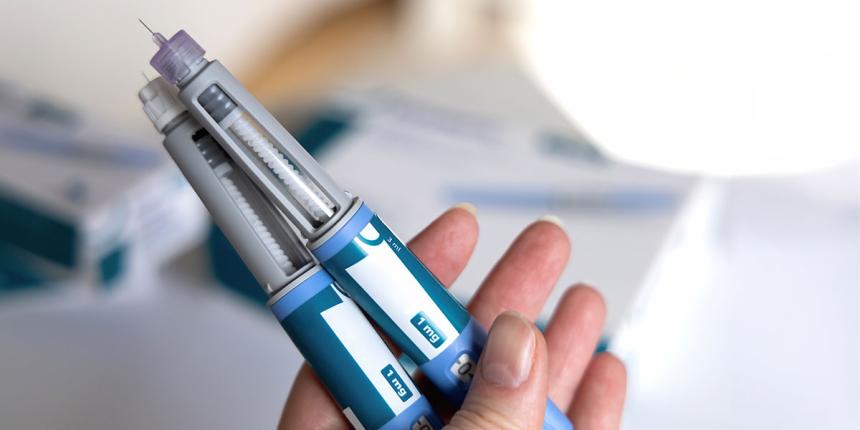Who Should Take Ozempic, Wegovy or Mounjaro — the New Weight-Loss Drugs?

For dieters – and people who just want to lose a little weight – new drugs on the market are giving consumers a choice. While the drugs, which go under the brand names Wegovy, Ozempic, Trulicity and Mounjaro, seem safe and effective, they are not for everyone.
How the Drugs Work
The drugs are evolutions of earlier injectable type 2 diabetes drugs. At a high level, they work by targeting the areas of our body that regulate our appetite, controlling blood glucose levels and reducing cravings while helping keep energy levels normal.
Specifically, Wegovy and Ozempic mimic the hormone glucagon-like peptide 1 (also known as GLP-1). This hormone helps control our blood sugar levels while targeting an area of the brain that regulates appetite. The drugs control blood sugar spikes, reduce appetite and help maintain energy levels.
Mounjaro works similarly. It also contains a GLP-1, and also a glucose-dependent insulinotropic polypeptide, or GIP, receptor agonist. When we eat, GLP1 and GIP hormones are released to tell the body that we’re full. They instruct the pancreas to release insulin, which lowers blood sugar levels and slows digestion.
There are other, similar drugs on the market, including liraglutide (brand name Victoza), dulaglutide (brand name Trulicity), setmelanotide (brand name Imcivree) and lixisenatide (brand name Adlyxin).
They are all different from earlier diet drugs from the 50s, 60s and 90s, which were mainly amphetamine-based. These earlier diet drugs worked by encouraging energy expenditure — and had dangerous side effects.
Who Are the Drugs Designed for?
The drugs aren’t for everyone. They were originally created to address type 2 diabetes and obesity. In fact, Ozempic is generally prescribed only for people with type 2 diabetes. Wegovy and Mounjaro are prescribed for people who are obese (a body mass index of 30 or higher) or overweight (BMI > 27) with related health conditions like high blood pressure.
They are generally not approved for people with certain conditions like type 1 diabetes or people who are pregnant or under 18, who have diabetic retinopathy or pancreatitis and a family history of thyroid issues. Each drug has a list of exceptions. They are also not designed for people who want to drop a few pounds or get in shape for swimsuit season.
What Are the Drugs’ Side Effects
The drugs also have similar side effects – mainly gastrointestinal. They include diarrhea, nausea, vomiting, stomach pain, constipation, heartburn, feeling bloated, belching and gas, along with headache, fatigue, runny nose and sore throat.
The drugs can also affect vision, including blurriness, worsening of retinopathy and macular complications.
Because all the drugs are injectables, injection-site complications can also occur, but are generally minor. The drugs have also been linked to more serious side effects, including kidney, gallbladder, pancreas and thyroid issues.
There are a growing number of lawsuits over the side effects like stomach paralysis and intestinal paralysis or obstruction. Litigation over new drugs and their side effects are not unusual.
Long-term side effects are not yet known.
Beyond Side Effects
There are some other drawbacks to the new drugs:
They’re expensive and not always covered by insurers — especially if you don’t fit the underlying condition the drugs are designed for. Most of these drugs cost around $1,000 a month.
They may not be available. Shortages have been an issue for consumers, from the drugs to the injectable pens that deliver the medicine. There is a tablet form of semaglutide called Rybelsus.
Just like other diets, when many people stop taking the drugs, they gain the weight back. In that sense, the drugs may need to be taken forever.
They’re injectables. Although several manufacturers are working on pill forms, right now they require injections. The frequency may be as low as once a week, but the drugs still need to be injected.
The drugs suppress appetite, but you still need to change your eating habits to get the full health benefit of losing weight.
Benefits of the Drugs
Beyond weight loss and tighter diabetes management, there is evidence the drugs can help reduce the burden of heart disease. Heart disease is the number one cause of death, and it's inextricably linked to obesity and diabetes.
A large study of 17,600 patients, recently published in the New England Journal of Medicine, demonstrated Wegovy’s potential effect on heart disease. The study found that people who were obese or overweight with pre-existing cardiovascular disease had fewer incidences of death from heart disease, nonfatal heart attacks and nonfatal strokes by the follow-up period of the study, which was on average 40 months.
The study was funded by the Wegovy’s manufacturer.
Other studies have linked the drugs to improved outcomes for people with type 2 diabetes and depression, and they may even help reduce alcohol consumption.
How Much Weight Can I Lose?
Though some people lose lots of weight on these drugs, studies have shown modest weight loss of five to six percent in the first year. For a 200-pound person, a five percent weight loss is 10 pounds. In some people, there’s no weight loss at all.
Studies have also shown that people who quit the new drugs gain two-thirds or more of the weight they lost back.
Some people lose a lot of weight quickly – so much that others see it in their face. The popular term for this: Ozempic Face. However, this is common any time rapid weight loss occurs rapidly, when people lose fat in their face that may hide aging.
Still, the drugs are showing promise, especially in a country where 1 in 3 adults are overweight and 2 in 5 are obese. Many consumers find traditional weight-loss programs slow, difficult and ineffective.
That doesn’t mean the drugs are the solution for everyone. Weight loss, even with these new drugs, takes commitment and should be only undertaken in consultation with your primary care doctor.